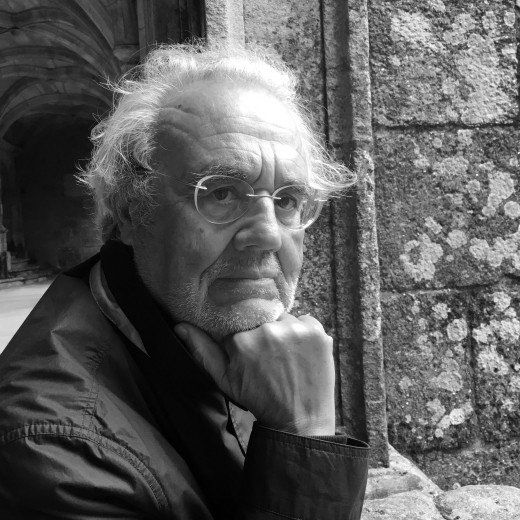The Eye of the Sky
Original title: El ojo del cielo
At the heart of this novel there are four women – Margarita, the young and beautiful mother; Valen, her older daughter, the rebellious middle daughter, and little Clara—whose lives seem to become difficult due to economic reasons as well as a burst of sensuality. In a photograph of the four, we can observe the shadow of who took it, a father that makes a living selling exquisite ice cream here and there, and whom they never heard from again after he ran away in order to escape a dramatic persecution due to some debt—the same debt that pushes the four women to leave their house and move to a hut in the countryside.
Manuel Gutiérrez Aragón paints the portrait of a family universe that oscillates between realism and magic, and is presided over by the sphere of a radar that, from the top of the mountain, contemplates the movements of the four woman as a powerful eye, the eye in the title of this novel.
A short and agile novel, whose plot moves forward driven by the author’s mastery of language and an intelligent and cult sense of humor.
«Gutiérrez Aragón has a perfect command of the mechanisms of writing, but he also knows how to delve into most tortuous corners of human psychology» – Esteve Riambau, Avui
At the heart of this novel there are four women – Margarita, the young and beautiful mother; Valen, her older daughter, the rebellious middle daughter, and little Clara—whose lives seem to become difficult due to economic reasons as well as a burst of sensuality. In a photograph of the four, we can observe the shadow of who took it, a father that makes a living selling exquisite ice cream here and there, and whom they never heard from again after he ran away in order to escape a dramatic persecution due to some debt—the same debt that pushes the four women to leave their house and move to a hut in the countryside.
Manuel Gutiérrez Aragón paints the portrait of a family universe that oscillates between realism and magic, and is presided over by the sphere of a radar that, from the top of the mountain, contemplates the movements of the four woman as a powerful eye, the eye in the title of this novel.
A short and agile novel, whose plot moves forward driven by the author’s mastery of language and an intelligent and cult sense of humor.
«Gutiérrez Aragón has a perfect command of the mechanisms of writing, but he also knows how to delve into most tortuous corners of human psychology» – Esteve Riambau, Avui
